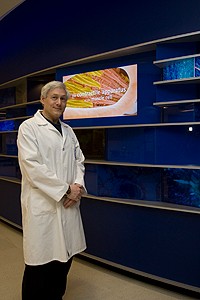
2009 George Rieveschl Jr. Award for Distinguished Scientific Research: Jeffrey Robbins
Jeffrey Robbins lives life in the fast laneand thats not just because he enjoys fast cars, like the Ferrari he drives into work on the weekends.
Im much more comfortable being uncomfortable, says Robbins. In this field, you have to be brave enough to try new things.
The worst mistake I see in scientists is not being brave enough to change.
Robbins love for living on the edgeat least scientifically speakingis what led to his worldwide recognition for the development of tools currently used to affect the protein balance in the heart.
Its also what has earned him the 2009 George Rieveschl Jr. Award for Distinguished Scientific Research.
Robbins says he is honored to be placed into the same category as George Rieveschl Jr., the pioneering UC researcher perhaps best known for inventing Benadryl, but it isnt the recognition that inspires him every day.
You dont go into this business to win awards, he says, smiling. I have the best job in the world. I get paid to play.
Robbins version of play means discovering the innovative tools used to help cardiac researchers understand the behavior of both the normal contractile proteins and the mutations that cause cardiovascular disease.
It was 1985 when Robbins came to UC as an associate professor of pharmacology and cell biophysics and began his heart research by looking at the embryos of chickens.
There was no way to truly work with genetics using chicken embryos, he says. In 1990, I started thinking about mammalian systems where we could focus on genetics. Without genetics, we couldnt ask those cause-and-effect questions.
Robbins says his scientific tactics revolved around central questions and the tools it took to answer them.
If the tools were not available, then we just took the time to develop them, he says simply.
Now, these tools, which cause the heart to synthesize normal and mutant proteins, are used in laboratories all over the world.
We can turn the processes on and off at will, allowing us to establish cause-and-effect relationships between the mutant proteins and the development of cardiac disease, Robbins explains.
Currently, Robbins and his team are doing basic research to find the similarities between neurodegenerative diseaseslike Alzheimersand heart failure.
We found both types of diseases contain unfolded proteins, or proteins that are not put together properly, he says. We want to discover why this occurs, stop them from injuring the cells and put them together properly ourselves, avoiding the defect.

Jeffrey Robbins
The team is also researching signaling pathways in congenital heart disease and ways to genetically modify them in addition to hypertrophic cardiomyopathy, where part of the heart muscle thickens without an obvious cause and can cause death from sudden cardiac failure.
Robbins, who has risen through the ranks at UC and is also associate chair of research at Cincinnati Childrens Hospital Medical Center, says this recent research along with past findings will continue to change the way medicine is practiced in addition to impacting the lives of patients.
Its incredibly gratifying to know that what I do every day will improve the lives of people, he says.
But Robbins, the scientific daredevil in him alive and thriving, says the key to research that truly makes a difference is constant modification and never being too afraid to try something new.
If you stay static in a field such as this, youre finished, he says.
Additional Contacts
Katie Pence | Director | Media Relations + Content
katie.pence@uc.edu | 513-558-4561
Related Stories
The 2024 Toast recognizes achievements of Lindner’s Business...
April 25, 2024
The Carl H. Lindner College of Business Office of Inclusive Excellence hosted its annual Toast event for the Business Fellows program April 18 at The Graduate Hotel Cincinnati.
2024 Daniel Drake Medals to be awarded April 27
April 24, 2024
The UC College of Medicine will award three people with 2024 Daniel Drake Medals April 27.
UC education allowed couple to make mark on Cincinnati
April 24, 2024
As a native of Defiance, Ohio, John Deatrick, CEAS ’79, says arriving in Cincinnati to attend the University of Cincinnati in 1963 felt like landing in New York City.
